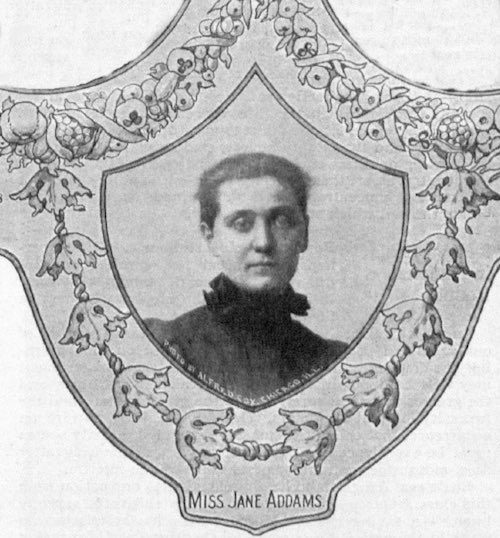Jane Addams: America’s Radical Pragmatist

December 10 is Jane Addams Day, the day we celebrate a woman known as the “mother” of social work and the first American woman to be awarded the Nobel Peace Prize. While her achievements were impressive, her efforts started modestly.
Addams was 39 years old in 1889 and still trying to find a direction in her life when she and former classmate Ellen Starr opened Hull House, a settlement house in the slums of Chicago. Settlement houses were residences for reformers and volunteers who provided aid to underprivileged families, including recently arrived immigrants.
At first, Addams and Starr offered readings from books and slide shows of paintings, but quickly learned there was a greater need for a place where mothers could bring their young children. So the two started a kindergarten and set aside a room where mothers could socialize. Within weeks the kindergarten was filled, and 70 more children were on a waiting list.
A day-care center and nursery soon followed, then a club for teenage boys, the area’s first library, and employment bureau. By its second year, Hull House was providing services to two thousand people a week.
Addams invited America’s leading lecturers, reformers and union organizers to speak and meet at Hull House.
She founded the Immigrants Protective League in 1909 and led investigations into drug abuse, milk contamination, and other public health issues. She was instrumental in getting Congress to pass legislation to limit child labor as well as getting women the right to vote. An ardent feminist, she said, “I do not believe that women are better than men. We have not wrecked railroads, nor corrupted legislature, nor done many unholy things that men have done; but then we must remember that we have not had the chance.”
Her heartfelt pacifism, which led to her opposition to World War I, made her controversial, but it also led to her being awarded the Nobel Peace Prize in 1931.
She died in 1935.
This short piece from the August 4, 1900, issue of The Saturday Evening Post provides an interesting look at the young reformer and how she was enhancing America’s international reputation.
Settlement Worker Wins the French
Miss Jane Addams, the young philanthropist of Chicago, was made the recipient of much attention from prominent people in France, and when she appeared and made a short address on one of the special days of the [Paris] Exposition—one of the women’s days— it was conceded that she was among the most worthily notable of all the Americans who had this year crossed the Atlantic.
It is on account of her social and economic studies that Miss Addams is famous, for she is a leader in what is known as ” settlement ” work, and it was she whose influence was the most operative in the founding of Hull House, in Chicago.
She is a typical Western girl. She was born in Illinois, where her father attained some prominence as a political leader. She was given a good education, and then, with a young woman friend, a fellow-graduate, traveled through Europe for the sake of further study, and to see the world before deciding upon the question of a career. There is a breezy Westernness about all this that is very attractive and characteristic.
In the cities of Europe it chanced that the minds of the two friends were turned especially toward the poor and their environment, and so deeply impressed were they by what they saw and by the possibilities that opened before them, that they decided that slum work in Chicago should be their life work and mission.
It was a little more than ten years ago that Hull House was founded, and it is now doing a wonderful work. It carries on a striking variety of classes, its system of clubs is working out great results, while in its care for the sick, the poor, the hopeless and the wretched it is of vast benefit.
An intense earnestness, combined with a magnetic personality have enabled Miss Addams to achieve her success. Her face is full of character, and there is a fine quality about it that at once attracts. Withal, there is a sadness, as if the depth of sorrow of which she has had to learn in her mission has left its indelible mark upon her.
Besides making an address at the Exposition, Miss Addams met many of the most noted French students of sociological matters, and discussed with them the varied phases of the problems of the ” submerged tenth.” [the hypothetical tenth of a country’s population that lives in permanent poverty]
The Frenchmen, enthusiastic when an attractive woman is concerned, unanimously agreed as to her magnetic charm, and vied with each other in expressing admiration for the woman herself and for the earnestness with which she presented her views on the lives and conditions of the poor, and the possibilities of close and sympathetic touch in ameliorating those conditions. Miss Addams believes that ” settlement” work is only one manifestation of a wide and deep humanitarian movement that, throughout Christendom, is working for the betterment of the unhappy and almost neglected classes of society, and striving to lift them higher.
Featured image: Library of Congress